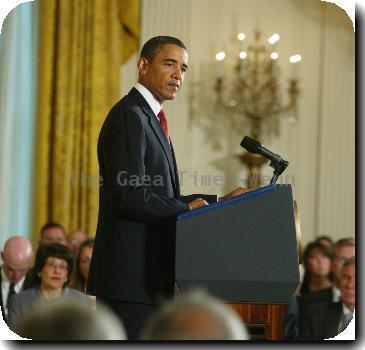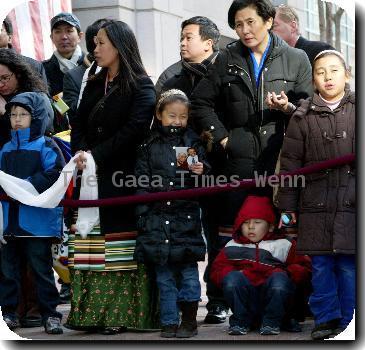2 European nations accept Guantanamo detainees as part of US plan to one day close the prison
By Daniel Woolls, APWednesday, February 24, 2010
Spain takes 1st Guantanamo inmate, Albania takes 3
MADRID — The United States got help from Europe on Wednesday in its troubled drive to shut down Guantanamo Bay, as Spain accepted a former inmate from the prison for terror suspects and the tiny Balkan nation of Albania took in three more.
Spanish Interior Minister Alfredo Perez Rubalcaba identified the man as a Palestinian, and reiterated that Spain will take in up to five ex-Guantanamo inmates, the largest commitment yet from a European country since President Barack Obama pledged in January 2009 to close Guantanamo in a year, a deadline he missed.
The U.S. Justice Department issued a statement expressing gratitude to Spain and said there are now 188 inmates being held in Guantanamo.
Separately, Albania’s Interior Ministry said that the country had taken in three more former Guantanamo detainees — a Tunisian, an Egyptian and a Libyan national — under an agreement with the United States. They arrived Tuesday.
The United States has been asking countries to take in former prisoners on grounds that in some cases it is not safe to send them home, fearing they might suffer reprisal after being held in U.S. custody.
Amnesty International’s office in Brussels said 11 European countries have agreed to take in, or already done so, a total of 22 former inmates. Aside from Spain and Albania, the others are Belgium, France, Hungary, Ireland, Portugal, Switzerland, Slovakia, Latvia and Bulgaria. Most have accepted one or two, or three at most.
The United States is “basically happy that Europe is assisting in any way” but wants Germany chip in, too, said Rikard Jozwiak, an Amnesty International spokesman.
The Spanish minister said the Palestinian met a key condition, which is that he does not have charges pending in the United States, Europe or the Palestinian territories. The Palestinian will be able to work in Spain and move around the country freely, but cannot leave it, in accordance with an agreement among European Union countries.
Perez Rubalcaba would not give the name of the Palestinian or any other information, citing privacy concerns.
“We do not want to give more details simply because our aim is for those who come to Spain to be able to live their lives,” Perez Rubalcaba said.
However, the man was identified by his family as Walid Hijazi, originally from the town of Khan Younis in Gaza.
A relative who spoke on condition of anonymity told The Associated Press they received a message Tuesday saying Hijazi had been released and sent to Spain.
The relative said Hijazi left Gaza in 2000, ostensibly for a pilgrimage to Mecca and that the family lost touch with him after that. In 2003, the family was informed by the Red Cross that he was in Guantanamo, and since then, it had received messages from him every three or four months.
Perez Rubalcaba said Spain is still studying case files on other candidates for coming to Spain from the U.S. naval base in Cuba.
Albania said in a statement it has a concrete commitment “to support President Obama’s administration in closing the Guantanamo center.”
Since 2006, Albania has taken eight former detainees from the U.S. prison in Cuba, including five members of China’s Muslim Uighur minority. They have been offered assistance in finding jobs but are not allowed to leave Albania.
The U.S. Justice Department identified the three who just arrived in Albania as Saleh Bin Hadi Asasi, a native of Tunisia; Sharif Fati Ali al Mishad, a native of Egypt; and Abdul Rauf Omar Mohammad Abu al Qusin, a native of Libya.
Since 2002, more than 580 Guantanamo Bay detainees have been sent to 39 countries, it said.
Obama had pledged to close the Guantanamo prison in January of this year but missed that deadline as the United States struggled to find takers for the inmates.
His special envoy for this task, Daniel Fried, met with Spanish officials in Madrid in June and asked Spain to accept four prisoners. From the outset Spain was receptive, and during later talks the Spanish apparently agreed to consider taking in as many as five.
Prime Minister Jose Luis Rodriguez Zapatero has been eager to establish good ties with the United States and Obama, after angering then-President George W. Bush in April 2004 by withdrawing Spanish peacekeepers from Iraq.
Zapatero also has agreed to send more Spanish troops to Afghanistan in response to a plea from Obama for more allied help in fighting the Taliban.
Associated Press writers Karin Laub in Jerusalem, Llazar Semini in Albania and Robert Wielaard in Brussels contributed to this report
Tags: Africa, Albania, Barack Obama, Belgium, Brussels, Caribbean, Cuba, Eastern Europe, Europe, Gaza Strip, Geography, Latin America And Caribbean, Madrid, Middle East, North Africa, North America, Palestinian Territories, Spain, United States, Western Europe





